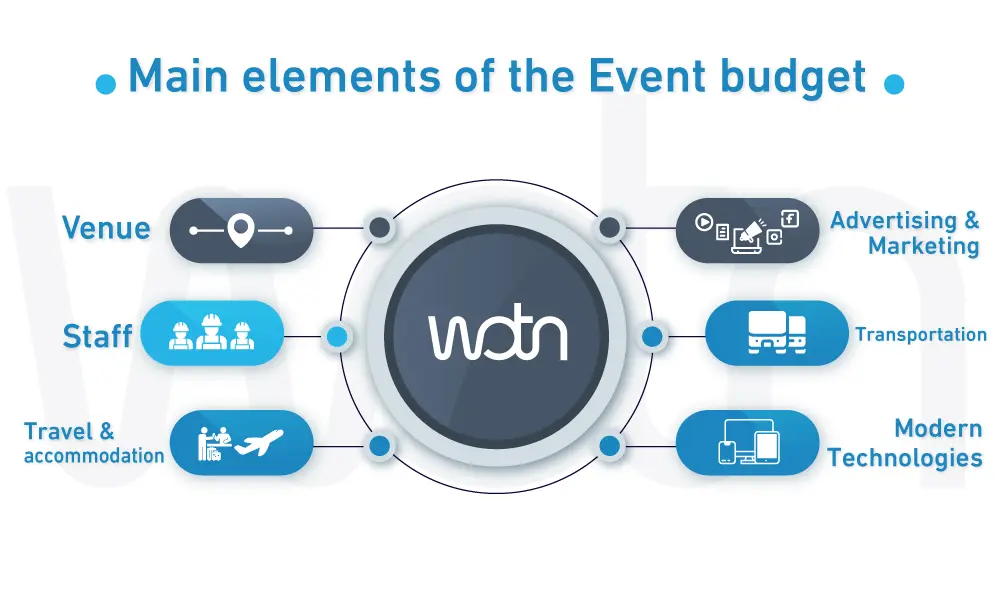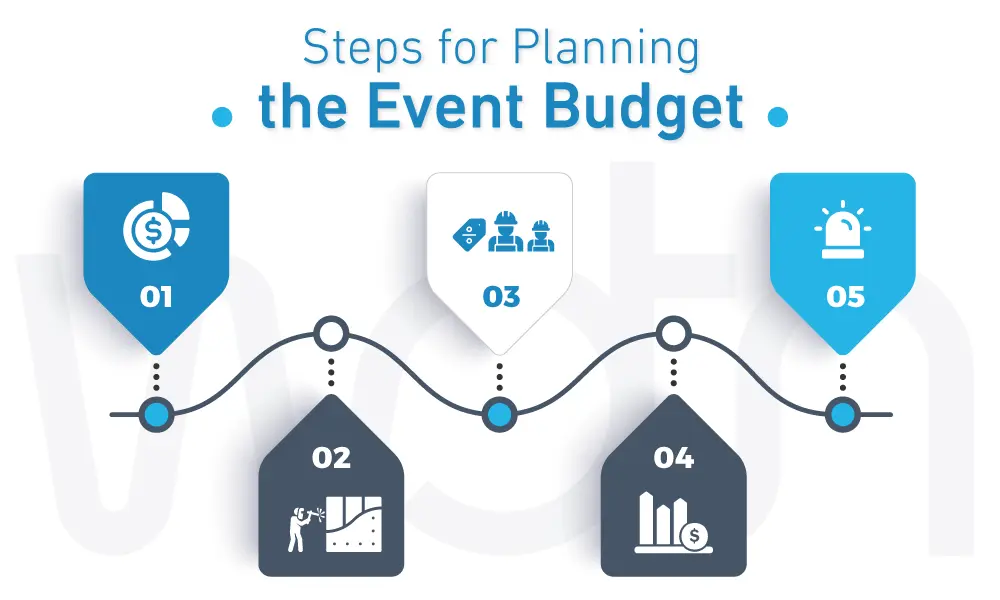Your Vision, Delivered
Say hello to the real experience!
Bring your next event to life—guided by experience, innovation, and excellence.
Let’s create together
Do you believe that event organization solely revolves around choosing the venue, date, or inviting guests? Definitely not. It requires significant effort in planning, coordination, and execution. Among all the aspects that require consideration, the budget stands out as a crucial factor in determining the fate of the event-whether it will be a success or a failure. Planning the event budget is essential, regardless of the type of event you are organizing, be it a conference, festival, or exhibition.
Comprehensive cost understanding can save you a lot of money and time, ensuring efficient use of funds to successfully achieve all your goals. It also helps minimize risks and improve the return on investment. Therefore, in this article, we will provide you with a precise and accurate guide on planning an event budget. We will cover its importance, the necessary elements it should include, the best strategies for preparation, and how to evaluate it after the event.
As previously mentioned, good and accurate planning of the event budget is considered the key to success in achieving a distinctive and inspiring event. There are numerous compelling advantages to meticulous budget preparation, including:
The event budget comprises two primary sections: "Revenues" and "Expenses." The "Revenues" section includes the funds generated from ticket sales, sponsorships, donations, and other sources of funding. On the other hand, the "Expenses" section covers the costs involved in organizing the event.
Here are some important items to consider when planning the event budget:

The costs of organizing an event largely depend on choosing its location. For example, you can rent a large conference hall to accommodate the attendees or opt for an outdoor site that suits your needs. The expenses should also include decorations, lighting, and other necessary arrangements to make the venue ready. Therefore, selecting the venue carefully is crucial to ensure easy accessibility and the availability of proper infrastructure.
Staff plays a crucial role in the success of any event. Therefore, the event budget must encompass the expenses related to hiring both employees and volunteers who will contribute to various aspects of the event, including registration, marketing, organization, management, and security. Remember, assembling a skilled and well-trained team is paramount to ensuring the event's success and delivering an outstanding experience for the attendees.
It is crucial to incorporate accommodation costs into the overall event budget to avoid overlooking this essential aspect and to ensure adequate financial flexibility for a successful event. Be diligent in identifying accommodation options that fit your budget and meet the attendees' needs. Don't hesitate to explore suitable choices that align with the event's requirements, as you might discover special offers from hotels or other facilities, particularly when dealing with a large number of attendees.
Advertising and marketing play a crucial role in attracting audiences and ensuring the success of the event. These expenses may encompass the design of printed materials, advertisements, and the use of social media and online advertising. Therefore, it is vital to allocate an appropriate budget for this aspect, as the advertising and marketing efforts will significantly contribute to attracting the largest possible number of attendees.
Ensuring convenient and comfortable access for staff, volunteers, and guests to the event venue may require providing transportation. Therefore, it's vital to factor in these costs when choosing the event location and assessing available transportation options.
Many successful events rely on cutting-edge technologies in various fields, such as display screens, lighting control systems, and audio equipment. These technologies enable the delivery of a unique and enjoyable experience for attendees. Therefore, the event budget must include the costs of providing the necessary equipment and technologies to run the event smoothly and flawlessly.
Despite thorough planning for all the aforementioned points and other aspects that require careful preparation and organization, there is a significant possibility of encountering unexpected costs during the event. Therefore, it is crucial to reserve a portion of the budget to handle such circumstances, such as dealing with emergencies or insurance costs.
Read More About: Planning and Organizing a Successful Scientific Conference
Discover the best strategies for planning the event budget to create a well-structured plan that optimizes expenses and avoids losses or failures. Here are the most important steps to follow:

The journey of planning the event budget begins with determining the total amount available for organizing the event you intend to hold. The first and essential step is to calculate all the available financial resources accurately and diligently. This includes the funding gathered from participants, partners, and sponsors. If you have a predetermined budget, you must specify the amount available for the event and adjust your plans accordingly based on this amount.
Preparing a detailed list of expected costs is a crucial step in ensuring organized and accurate event planning and execution. We will divide the expenses into two main stages:
To make the most of your budget, exhibit your creativity in seeking optimal solutions. Request multiple quotes from suppliers for each budget item, and meticulously compare the offers. This process allows you to identify the most cost-effective prices that meet your expectations, ultimately leading you to select the ideal offer perfectly aligned with your budget.
This aspect holds immense significance as accurate forecasting of expected revenues is vital for effective planning. Conducting an in-depth market study, comprehending the target audience, and evaluating potential revenue streams like ticket sales, additional purchases, sponsorships, and partnerships are essential. Embrace diverse revenue sources and rely on meticulous estimations to achieve a harmonious financial balance.
Remember to allocate a dedicated percentage of the budget to address any unforeseen emergencies or unexpected cost increases. It's essential to be prepared for situations like equipment breakdowns, unforeseen delays, or external factors beyond your control. Having a financial reserve ensures that you can handle such circumstances without hindering the event's progress creatively and effectively.
Read also: Virtual Event Trends you Need to Know in 2023
By following and carefully implementing these tips, you can prepare a well-integrated and accurate event budget that guarantees its success and professionalism.

After the event concludes, it's time to evaluate the budget and analyze its performance compared to the original plan. This evaluation aims to measure the achievement of financial goals and identify strengths and weaknesses in financial resource management. To ensure an accurate assessment, follow these steps:
Collect the actual amounts received and spent during the event's planning and execution. Obtain this information from invoices, receipts, reports, contracts, and other financial documents. Record these data in a budget table alongside the planned or expected figures.
Identify the variances between actual and planned or expected revenues and expenses. Calculate these deviations by subtracting the actual value from the planned or expected value for each budget item. Then, compute the deviation ratio by dividing the deviation by the planned or expected value and multiplying it by 100. These ratios will help you determine the extent of deviation for each budget element from your financial plan.
Examine the deviations and ratios obtained and understand their reasons and impact on the event's performance. Categorize these deviations as positive or negative, depending on whether they increase or decrease the event's profitability. Then, assess the magnitude of the deviations and determine whether they are acceptable or unacceptable. Based on this analysis, extract lessons learned and insights from your experience, and identify areas for improvement and development in future events.
By following these steps, you will effectively evaluate the budget, gaining a deeper understanding of financial resource management for events. These actions will enable you to make well-informed financial decisions and enhance the performance of future events.
In conclusion, after reviewing the steps and key elements that form the basis of a comprehensive and well-planned event budget, you must keep in mind that the budget is not just a list of numbers; it is a bridge that connects your ideas to achieving your goals. Therefore, you may always need to review and continuously update it according to the circumstances and changes that may occur during the stages of organizing and executing the event. Additionally, you should use the best available tools and methods to prepare, monitor, and evaluate the budget accurately and professionally. If you want to learn more valuable information about the world of event management and successful event organization, keep following us for the latest updates.
Say hello to the real experience!
Bring your next event to life—guided by experience, innovation, and excellence.
Let’s create together
